Chickens need grits in their diet to help them break down their food and produce quality eggs. There are two types of grits that the chickens require. With the grits, how would you go about giving it to your chickens? What are some of the options?
Do you mix grit in with chicken food? It depends on the feed that you buy and the type of grits. For soluble grits, most manufacturers will mix them into the feeds, especially layer feeds. If so, you do not need to put anymore. For insoluble grits, you can mix them into their feeds. Free-ranging chickens won’t need grits added to their feed since they will find them naturally as they are foraging for foods.
Why Do Chickens Need Grit With Their Food?
Grits are something that the chicken needs along with their food. The grits will help them grind up their food for digestion.
Chickens don’t have the same digestive system as humans do. Due to their beaks not being able to grind food, another organ in their body does the grinding. This is the reason why you’ll notice chickens peck and swallow their food whole.
When a chicken swallows their food, it will go down its throat and store in its crop. When the food is ready to be processed, it will go further down into the digestive system. The food will pass through the glandular stomach and into the gizzard.
The gizzard is where all the foods will be ground down. The food is broken down in the gizzard with the help of the grits.
Without grits, the gizzard won’t be able to grind the food down, and it will cause digestive problems.
Different Types Of Grits
When it comes to grits for your chickens, there will be two different types of them.
One of them is insoluble or flint grit. The insoluble grits are needed by the chickens to help them break down their food in the gizzard.
Insoluble grits are sandstone, pebbles, and sand. These objects can be found naturally in the environment.
The second type of grit is soluble or oyster shell grit. Oystershell grit is a type of calcium that helps make eggshells stronger. These days, most manufacturers have formulated soluble grits into their feeds. It will usually be available as layers mash or layers pellets.
How Should You Feed Grit to Chickens?
When it comes to grits, there are 3 different ways you can provide it for them:
Toss It Onto the Ground
This is the simplest way, and it’s natural for the chickens. Chickens spend most of their time during the day foraging for food.
Toss some grits onto the ground when the chickens are feeding. They will eat some grits when their body requires it.
Mix Grits in With Their Food
This method is a great way to give grits to your chickens. You can mix it in with any of their feeds or food.
This is a common practice to supplement a hen’s diet. When the hen is laying eggs, you can give them grit that’s rich in calcium. You can use cockle or oyster shells, or limestone as supplements.
Laying hens need about 5 grams of calcium each to produce quality eggs.
Place It In The Feeder
For insoluble grit, most chicken owners will just keep them topped up in a grit feeder. A grit feeder is just a feeding container that keeps the grits dry.
Chickens are smart animals, and they know when they will need grits into the digestive system. They will eat the right amount of grits when they need it.
Can Chickens Eat Too Much Grit?
Yes, chickens can eat too much grit. If that happens, it will result in an impacted crop.
However, it’s unlikely a chicken will eat too much of it. Chickens are able to determine how much grit they need and will eat just enough of it.
If your chickens are allowed to roam freely in your yard, they won’t need any grits. Chickens are great at foraging for food and will pick up grits as they need them.
For chickens that are kept in an enclosure, they will need to be supplied grits. A lot of backyard chicken owners will add some grit to their feed. This will they will know how many grits the chickens are eating.
Conclusion
Grits are important for chickens as they need them for proper digestion and producing quality eggs. Be sure to give them both insoluble and soluble grits. You can mix it in with their foods or feeds.


